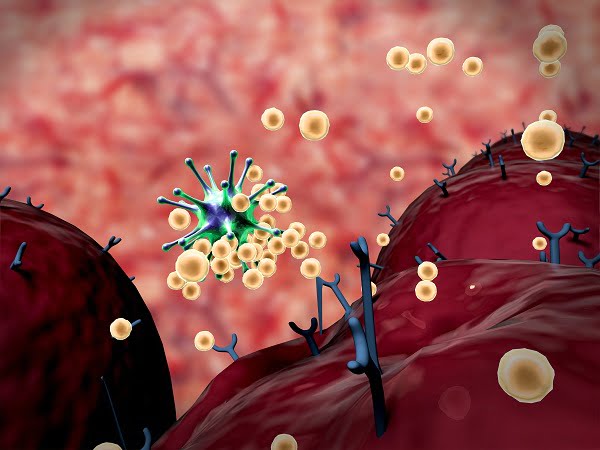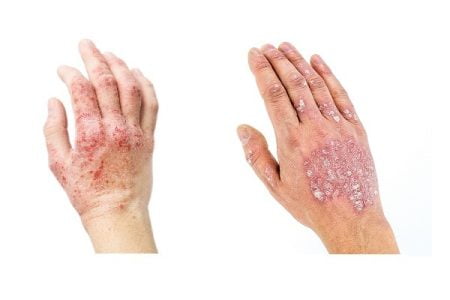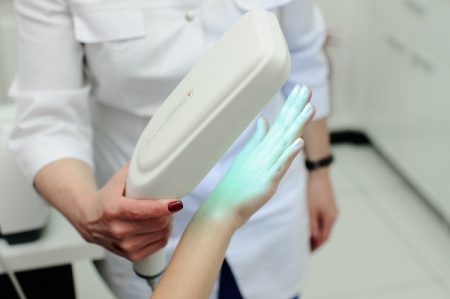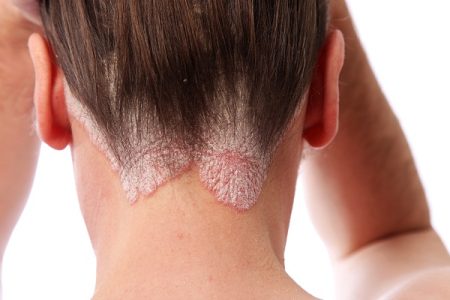Causes and Risk Factors for Psoriasis
- Updated on: Jun 27, 2024
- 4 min Read
By
- Published on Sep 26, 2019


Psoriasis makes the cells of the skin to grow about five times faster than the normal growth. And the body can’t handle this sudden growth. The old ones pile up making thick, flaky, itchy patches. This may affect a particular area or the whole body of the person.
What Are The Causes of Psoriasis?
Till now there are no evidences, which can show the exact cause of psoriasis. Thus the causes are still unknown, but it is believed that psoriasis is the result of several factors, such as genetics, environmental factors, and the immune system.
It is common that members of the same family may suffer from psoriasis. Defects in immune regulation can be the reason for psoriasis. Defects in immune system refer to a condition in which white blood cells called T cells mistakenly target healthy cells instead of attacking foreign harmful substances.
The control of inflammation also plays a major role. Despite research over the past 30 years, the “master switch” that turns on psoriasis is still a mystery.
Still, some of the factors that can be the cause of psoriasis are described below:
Problems with the immune system
The immune system is said to be our body’s defense against diseases and it helps in fighting an infection that is harmful to the body. One of the main types of cells used by the immune system in body defense is called a T-cell (or white blood cells).
T-cells are like a fighter force of the body which normally travels through the body to detect and fight invading germs such as bacteria. But in people suffering from psoriasis, the genes that control the immune system get mixed up.
Instead of protecting the body from invaders they start to attack healthy skin cells by mistake. Thus the deepest layer of the skin produce new skin cells more quickly than usual, which in turn triggers the immune system to produce more T-cells.
This immune system response results in a range of reactions, including:
- Enlargement of blood vessels in the skin
- Increased number of white blood cells which are responsible for producing new cells more quickly than usual
- Increased number of skin cells, additional immune system cells and T cells
- Formation of new skin cells on the surface of the skin
- Development and accumulation of the thick, scaly patches associated with psoriasis
It’s not still known what exactly makes the immune system to act like that. But certain genes and environmental triggers may play a role.
Scientists say that there are about 25 genes that are different in people with psoriasis. More than one gene is required to cause the disease, and they’re looking for the main ones.
Genetics
Psoriasis is a genetic disease that means it runs in families. One in three people suffering from psoriasis have a family member or close relative suffering with the same condition.
However, the exact role of genetics in causing psoriasis is still unclear and under research. Research studies have shown that not one but many different genes are linked to the development of psoriasis.
Different combinations of genes can be responsible for it and may make people more vulnerable to the condition. However, having these genetic mutations does not necessarily cause the disease.
Psoriasis Trigger
Psoriasis trigger is a factor that typically initiates and even worsens the condition of psoriasis. It is important to identify the trigger and find measures to avoid it.
These can be environmentally or physically related. The triggers vary from person to person, but most common psoriasis triggers include:
- Cold temperatures
- Alcohol consumption in large quantities
- Smoking
- Having another autoimmune disorder, such as AIDS
- Infections that make immune system weak, such as strep throat, cold, flu, pneumonia, and viral fever
- A skin injury, such as a cut, bug bite, bad sunburn or rash (due to too much scratching)
- Excessive stress and hypertension
- Vitamin D deficiency
- Certain medications — including lithium, which is prescribed for bipolar disorder, high blood pressure medications such as beta blockers and antimalarial drugs
- Hormonal changes— particularly women go through a lot of hormonal changes during puberty and the menopause. These conditions may trigger psoriasis.
Psoriasis isn’t contagious, so it can’t spread from person to person.
Risk Factors of Psoriasis
A risk factor is any attribute, which increases the chances of developing a condition or disease.
Some factors, which increase the chances of developing psoriasis, are discussed below:
Family history
- About 1 in 3 persons, with one close relative (suffering from psoriasis), will develop the condition.
- If one parent has psoriasis, the chance is 10 percent, and if both parents have it, the chance is 50 percent that the baby will develop the condition.
Recurring viral and bacterial infection
Children and young adults with recurring infections, such as strep throat or upper respiratory infections such as cold and flu, are also at an increased risk.
HIV
Patients with HIV have a higher risk of developing psoriasis, compared to people who don’t have HIV.
Skin injury
Any type of skin injury can increase the chance of psoriasis. Sunburns, scratches, rashes, cuts or other skin related injuries act as a catalyst for the development of psoriasis.
Obesity
Deep skin folds are the areas, which are more prone to rashes and infections. People with excess weight face the problem of friction and sweating in their skin folds.
Friction and sweating cause rashes, which give rise and can lead to or aggravate psoriasis.
Regular tobacco use or smoking
The likelihood of acquiring psoriasis is twice in case of a regular smoker compared to a non-smoker. The risk increases as the use of tobacco in a day increases. The risk is higher in women than in men.
Alcohol
Alcohol consumption is associated with psoriasis in men. Alcohol can worsen the symptoms of psoriasis because it upsets the liver and may trigger the growth of Candida. Candida is a type of yeast that can worsen psoriasis symptoms. Alcohol if mixed with certain medicines can also have dangerous side effects. If you have a problem with alcohol, now could be the time to look into long-term residential treatment.
Mental Stress
If an individual is experiencing high-stress levels, the likelihood of individual’s risk of developing psoriasis is very high because stress directly affects the immune system.
Race
Fair people are more prone to develop psoriasis than people with a dark complexion.












